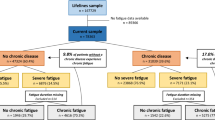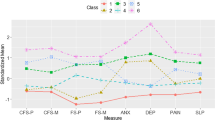Abstract
Chronic fatigue syndrome (CFS) and the symptom of chronic fatigue may be accompanied by substantial functional disability. A volunteer sample of twins discordant for fatigue was identified from throughout the US. Fatigued twins were classified using three increasingly stringent definitions: (1) ≥6 months of fatigue (119 pairs); (2) CFS-like illness based on self-report of the Centers for Disease Control and Prevention CFS research definition criteria (74 pairs); and (3) CFS assessed by clinical examination (22 pairs). Twins with chronic fatigue were compared with their unaffected co-twins on the eight standard scales and two physical and mental component summary scales from the medical outcomes study short-form health survey (SF-36). Substantial impairment was observed for fatigued twins across all levels of fatigue, while scores in the healthy twins were similar to US population values. Mean scores among fatigued twins on the physical and mental component summary scales were below 97 and 77%, respectively, of the US population scores. Diminished functional status was found across increasingly stringent classifications of fatigue and was associated with a dramatic decrement in physical functioning. The symptom of fatigue has a pronounced impact on functional status, especially in the domain of physical functioning.
Similar content being viewed by others
References
Fukuda K, Straus SE, Hickie I, Sharpe MC, Dobbins JG, Komaroff A. The chronic fatigue syndrome: A comprehensive approach to its definition and study. International Chronic Fatigue Syndrome Case Definition Study Group. Ann Intern Med 1994; 121: 953-959.
Komaroff AL, Buchwald D. Symptoms and signs in chronic fatigue syndrome. Rev Infect Dis 1991; 13: S8-S11.
Bombardier CH, Buchwald D. Disability and health care utilization in chronic fatigue, chronic fatigue syndrome, and fibromyalgia. Med Care 1996; 34: 924-930.
Buchwald D, Garrity D. Comparison of patients with chronic fatigue syndrome, fibromyalgia and multiple chemical sensitivities. Arch Intern Med 1994; 154: 2049-2053.
Buchwald D, Pearlman T, Umali J, Schmaling K, Katon W. Functional status in chronic fatigue syndrome, other fatiguing illnesses, and health individuals. Am J Med 1996; 101: 364-370.
Komaroff AL, Fagioli LR, Doolittle TH, et al. Health status in patients with chronic fatigue syndrome and in general population and disease comparison groups. Am J Med 1996; 101: 281-290.
Stewart AL, Hays RD, Ware JE Jr. The MOS short-form general health survey. Reliability and validity in a patient population. Med Care 1988; 26: 724-735.
Schluederberg A, Straus S, Peterson P, et al. NIH Conference. Chronic fatigue syndrome research: Definition and medical outcome assessment. Ann Intern Med 1992; 117: 325-331.
Hubric Z, Robinette CD. The study of human twins in medical research. N Engl J Med 1984; 310: 435-441.
Bouchard C, Lesage R, Lortie G, et al. Aerobic performance in brothers, dizygotic and monozygotic twins. Med Sci Sports Exerc 1986; 18: 639-646.
Hamel P, Simoneau JA, Lortie G, Boulay MR, Bouchard C. Heredity and muscle adaptation to endurance training. Med Sci Sports Exerc 1986; 18: 690-699.
Torgersen S. The determination of twin zygosity by means of a mailed questionnaire. Acta Genet Med Gemellol (Roma) 1979; 28: 225-236.
Eisen SA, Neuman R, Goldberg J, Rice J, True W. Determining zygosity in the Vietnam Era Twin Registry: An approach using questionnaires. Clin Genet 1989; 35: 423-432.
Robins LN, Helzer JE. Diagnostic Interview Schedule (DIS): version III-A. St. Louis: Department of Psychiatry, Washington University School of Medicine, 1985.
American Psychiatric Association. Diagnostic and Statistical Manual of Mental Disorders: DSM-III-R. 3rd ed. (revised). Washington DC: American Psychiatric Association, 1987.
Ware JE, Snow KK, Kosinski M, Gandek B. SF-36 Health Survey: Manual and Interpretation Guide. Boston: The Health Institute, 1993.
McHorney CA, Ware JE Jr, Lu JFR, Sherbourne CD. The MOS 36-Item Short-Form Health Survey (SF-36): III. Tests of data quality, scaling assumptions, and reliability across diverse patient groups. Med Care 1994; 32: 40-66.
Wells KB, Stewart A, Hays R, et al. The functioning and well-being of depressed patients. Results from the Medical Outcomes Study. JAMA 1989; 262: 914-919.
Stewart AL, Greenfield S, Hays RD, et al. Functional status and well-being of patients with chronic conditions. Results from the Medical Outcomes Study. JAMA 1989; 262: 907-913.
Ware JE, Kosinski M, Keller SD. SF-36 Physical and Mental Health Summary Scales: A User's Manual. Boston, MA: The Health Institute, 1994.
Quirk JT, Berg S, Chinchilli VM, Johansson B, McClearn GE, Vogler GP. Modeling blood pressure as a continuous outcome variable in a co-twin control study. J Epidemiol Community Health 2001; 55: 746-747.
Lewis DH, Mayberg HS, Fischer ME, Goldberg J, Ashton S, Graham MM, Buchwald D. Monozygotic twins discordant for chronic fatigue syndrome: Regional cerebral blood flow spect. Radiology 2001; 219: 766-773.
Schweitzer R, Kelly B, Foran A, Terry D, Whiting J. Quality of life in chronic fatigue syndrome. Soc Sci Med 1995; 41: 1367-1372.
Wilson A, Hickie A, Hadzi-Pavlovic D, Boughton C, Dwyer J, Wakefield D. Longitudinal study of chronic fatigue syndrome. Br Med J 1994; 308: 756-759.
McHorney CA, Ware JE Jr, Rogers W, Raczek AE, Rachel Lu JF. The validity and relative precision of MOS shortand long-form health status scales and Dartmouth COOP charts. Results from the Medical Outcomes Study. Med Care 1992; 30: MS253-MS265.
Author information
Authors and Affiliations
Corresponding author
Rights and permissions
About this article
Cite this article
Herrell, R., Goldberg, J., Hartman, S. et al. Chronic fatigue and chronic fatigue syndrome: A co-twin control study of functional status. Qual Life Res 11, 463–471 (2002). https://doi.org/10.1023/A:1015635113159
Issue Date:
DOI: https://doi.org/10.1023/A:1015635113159




